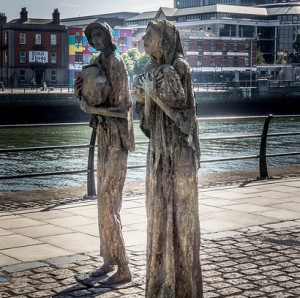
Direct Provision For Asylum Seekers
22 Oct 2015INTRODUCTION
Ireland’s system of Direct Provision has recently been declared ‘unfit for purpose’ in a report by an Oireachtas’ Joint Committee . A Government Working Group Report has recommended substantial changes to it. The system houses those who arrive in the state seeking refugee status while their applications are been considered.
BACKGROUND
Established in April 2000, in response to an accommodation crisis which saw asylum seekers sleeping rough. The Direct Provision System (DPS) has accommodated over 53,000 people in the past 15 years but was only ever intended as a short term measure.
The DPS was designed to house asylum seekers, people seeking to be recognised as refugees, until their cases could be decided. Under international law, Ireland is obliged to take in and offer protection to refugees who arrive here. Should someone be acknowledged as a refugee by the State, they will be allowed to reside in the Republic of Ireland and be entitled to the same social protection that all other Irish residents receive.
The DPS was created to house and provide a basic level of care to asylum seekers for ‘6 months at most’, The system was established with the intention of being an efficient and humane way to process those coming to Ireland before their applications for residency were decided.
Protection applicants are given a bed, three meals a day, and are entitled to certain government services such as primary and secondary education and a medical card. They are also given a stipend of €19.10 per week for personal items. Applicants are expected to live in Direct Provision centres until their application for refugee status, subsidiary protection, or leave to remain are granted, at which point they are legally allowed to leave the DPS, although many find barriers to doing so.
Applicants may be allowed to become Irish residents in one of three ways. If their application leads them to be recognised as refugees then Ireland is obliged to take them as a signatory to the 1951 Geneva Convention relating to the Status of Refugees. A refugee is someone who harbours a reasonable fear of persecution in their country of origin due to an aspect of their identity, such as ethnicity, religious belief, or political opinion. People who do not qualify as refugees may still apply for subsidiary protection, the status of which derives from European Law. Though not a refugee, someone will be granted subsidiary protection should they risk facing serious harm such as torture or inhuman punishment, or generalized violence or war by being sent back to where they have come from.
Those who are not eligible for either of the above statuses may still apply for leave to remain, which allows the applicant to reside in Ireland. Leave to remain is granted when the Minister for Justice does not issue a deportation order to such an individual. Such an order cannot be issued when an individual is at risk of refoulement. The Irish State is committed to non-refoulement; a principle in international law that forbids the returning a victim of persecution to their persecutor.
Applicants can appeal decisions at each of these stages. In addition, all of the above processes, along with the implementation of deportation orders, can be subjected to judicial review should the applicant mount a legal challenge against a decision.
CURRENT SYSTEM
As of June 2015 there were 7,939 people in the different layers of the asylum process, 49% of whom were in the protection process (their application for either refugee status or subsidiary protection was pending), a further 42% were at the leave to remain stage and 9% were at the deportation order stage. 21% (1,667) of the total population of the system were children.
55% (4,350) of all applicants had been in the system for 5 years or more; more specifically almost a third of all those in the protection process, three quarters of those at the leave to remain stage and 88% of those at the deportation stage had been in the system for 5 or more years.
Asylum seekers are not required to live in direct provision and a number choose to live in other accomodatio with family or friends. In June, the number of asylum seekers in Direct Provision was 3,607 (45 %). In addition, a further 679 were still resident in Direct Provision even though their applications for leave to remain had been granted. The current housing crisis makes it difficult to deal with the problem satisfactorily.
The Working Group identified the length of time taken as the ‘single most important issue to be resolved’ with the system. They found several reasons for these delays:
- Foremost, the lack of a single protection determination procedure has been identified as a key cause of long delays in the system. Ireland remains the only EU member state without a single protection determination procedure. This necessarily causes delays when, for example, an applicant is simply ineligible for refugee status but meets the requirements for subsidiary protection. Under the current system they have to apply for the former, be rejected and only then may they apply for the latter. More stages to the process also result in more appeals processes, causing further delays.
- An increase in the number of applications, up 53% in 2014, puts additional strain on an already backlogged system.
- Only a small proportion of applicants receive legal advice before the appeals stage of the process. The lack of accessibility of legal professionals to applicants at the early stages of the protection process has been shown to have a negative effect on the applicants. Pilot early legal advice schemes have been demonstrated to benefit to both applicants and the effective operation of the protection determination system
- There has been a low rate of recognition of persons who are eligible for refugee status or subsidiary protection. There was a rise in the rate of recognition for refugee status from 1.3% in 2010 to 17% in 2014 and rise from 0.6% in 2010 to 32% in 2014 in the rate of recognitions for subsidiary protection.
- A person’s leave to remain application cannot be processed to finality should they have a family member whose application is still in the protection stage or in judicial review. This creates a delay for those whose family members’ applications have yet to be processed.
- Finally, should a judicial review be taken against any part of the application process, further processing of the next stage of the process is suspended until the judicial review is complete. The volume of judicial reviews and a lack of resources in this area were also noted as problems.
WORKING GROUP REPORT
The working group published their report on the 30th of June 2015. Its recommendations included
Length of Time
- With respect to the length of time taken, the Working Group recommended that everyone awaiting decisions at the protection process or leave to remain stage who has been in the DPS for 5 years or more since their initial date of application should have their application fast-tracked, and should a decision not be made on these applications within a 6 month period leave to remain should be granted. This would affect 3,350 persons.
- If an applicant has been issued with an as of yet unenforced deportation order and has been in the DPS for 5 or more years since the initial date of application, they should have this deportation order revoked and leave to remain granted within 6 months. Parents at the leave to remain stage with children still in the DPS should have their leave to remain application processed without prejudice to their children’s claim. It is recommended that the children should then fall under their parent’s leave to remain grant. The Working Group also recommended that all cases under Judicial Review be resolved within 6 months and that enough staff, funding, and resources are allocated by the State to achieve all of the above.
- Most importantly, the Working Group recommended that a single determination procedure be adopted. The report noted that Ireland is the only country in the European Union not to have one. This deficiency has been a significant factor in the length of time taken to process applications.
Supports to Residents
- The Working Group noted that at present residents receive €19.10 a week per adult and €9.60 a week per child as an allowance. This number was set in 2000 and has not kept up with inflation. It has been deemed wholly inadequate to cover necessary costs such as clothing, schools supplies and supplementary food. As such it recommended that it this allowance be increased to €38.74 a week per adult and €29.60 per week per child.
- The Working Group also recommended that those who have been in the DPS for longer than 9 months and have co-operated satisfactorily with the process should be allowed access to the labour market, which is not allowed at present. Ireland is one of only two EU members who do not extend this right, in at least a qualified form, to asylum seekers.


